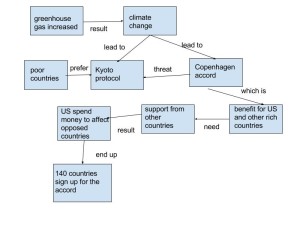The article was quite long, so it was little bit hard to draw diagram for me. So, I tried to draw a big picture and put important and main ideas. Everything was started from greenhouse gas and CO2 emission. As greenhouse gas emission with development of industries, climate has changed. So nations gather together to solve the problem, the first result was Kyoto protocol. Few years later, Copenhagen accord emerged which aim to cut down greenhouse gas. Not every nation agreed with Copenhagen accord especially poorer countries and rapidly growing countries like china. Those countries support Kyoto protocol it is because Kyoto protocol is which rich countries have binding obligations. So this is more favorable for them. For richer nations, at the same time, Copenhagen accord which can prevent to extend the Kyoto protocol need to pass the Copenhagen accord. Therefore US as a rich nation, they need support from nations that opposed to Copenhagen accord to pass the accord. This lead US to spend money secretly for opposed nations. The best example from article is Maldives. Maldives got 50 million dollars for supporting the accord. They even support actively than any other countries from poor countries. The other example is Ethiopia, US threat to Zenawi, Ethiopian prime minister that sign the accord or discussion ends now. So they also supported the accord. US did similar action to other nations and exchange financial aid with support. All this action ended up with 140 countries signed up for the Copenhagen accord.
As we learned from now, climate change is very serious problem. Because climate change is global scale problem, we all need to aware of it and try to solve the problem together. I think that’s why the political action is important like negotiation between countries and make protocol. I think what US did for get a support from other countries was not a good choice. In my opinion, Copenhagen accord which all nations without excepting developing countries and poor countries need to cut off the CO2 emission is better than Kyoto protocol which rich countries have obligation to cut off the CO2 emission. It is because as I said, climate change is global scale issue. All nations need to cooperate to solve the problem. So you might think that I agree with what US have done. But my response is no. US choose wrong way to persuade them. In politics, giving money to other country to get what they want is considered cheating. US cheated for their benefit, and this is from selfishness. This is problem in ethics view. But I can’t blame only US, all this event occurred because all nations take their profit and not considering environmental issue. For example, developing countries are one of the most emissive place because industrial development. This mean they need to cut off the CO2 emission for environment and sustainability. But they support Kyoto protocol since only rich countries obligatorily cut off CO2 emission so that they don’t have to reduce the CO2 emission and keep development. Today, earth already passed some planetary boundaries. All countries in the planet need to cooperate to save the planet.


Hi Jiye! My name is Peter Han and I am planning on studying mechanical engineering here at Penn State. What caught my eye was your last statement as it said that all countries need to cooperate for climate change to end. This is very true as it is a collective action problem and cannot be solved if everyone doesn’t participate. Climate change is too big of an issue to be overlooked. Even though the United States went at it in an unethical way, all countries need to participate in the effort to end climate change.
Here is a link to my blog: http://geog030.dutton.psu.edu/2016/04/08/peter-han-module-9/
Hello my name is Madison Halbom and I was interested in your post of climate change. When I saw that you chose the path of the Kyoto protocol I found this interesting at read your views on the matter. I very much liked how you were able to express the details throughly in you blog post, well done! Also I very much agree with your opinion on how protocol between counties is essential in the increased fight against climate change. http://sites.psu.edu/geog30/2016/04/08/climate-change-9/